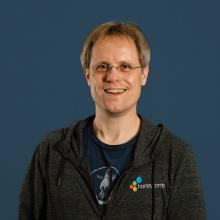Abstract
Technical concepts are something that are thought of, approached, and understood differently across engineers, managers, and executives. Bridging the gaps and providing understanding to a complex and nuanced topic across all three groups can sometimes feel impossible. In this talk, we'll do just that.
Together, we're going to go over not just platforms and platform engineering, but the very fabric of doing, what it means to learn, and how collective thought scales across a team, an organization and an industry. Utilizing that, we'll go over platform engineering from the perspectives of an engineer, a manager, and an executive. All at the same time.
Not only will we go over a consistent framework for how each group can think about and understand platform engineering, we'll spend time going over how each group can communicate with other and understand each other in a way that's effective, actionable, and transformative.
Interview:
What's the focus of your work these days?
The focus of my work, when distilled into a single question, is the everlasting pursuit of understanding the question: "What does fast, effective flow look like at the scale of humanity, and what does it mean to build a sociotechnical system that enables people to reach their fullest potential?"
This question has vastly different considerations to me when asked at the level of the IC, the team, the vertical, the organization, and the industry; consequently, much of my challenges revolve around trying to find that multiplicative set of actions that align the various scopes of influence, direction, interest, and motivation. Additionally, it's my opinion that we, as a social species, are still extremely immature when it comes to understanding how we truly learn, how we share ideas with each other, and how we grow in healthy and sustainable ways. "What does fast, effective flow" look like at the scale of an entire humanity is not something we are prepared to even visualize, but it is an idea that consumes me.
What's the motivation for your talk at QCon San Francisco 2023?
I find myself pondering what a platform is quite often. What does it mean for something to be a platform, what does it mean for a platform to be high leverage, and what makes them that way? I want to present what I think are some, hopefully, compelling answers to these questions and open up a dialogue into what it really means to be a platform engineering team, and how we define self-excellence when much of the goal is centered around multiplying the value of others.
How would you describe your main persona and target audience for this session?
The persona of this audience will be a tri-headed beast, because that is how I could currently best be described. I have spent the last while simultaneously operating at the Director level, the Engineering Manager level, and the Individual Contributor level. Balancing all three perspectives is... Difficult. That difficulty will be present here.
This talk is for someone who views executive alignment as one of their biggest drivers of value. It is also for someone who is seeking to understand how they might lead without authority and influence the growth of a nascent platform. It is also for someone who wants to know how they might go about building a platform, get that buy-in, and have a roadmap to pursuing this even when being an IC.
Is there anything specific that you'd like people to walk away with after watching your session?
For those who pursue executive alignment: This talk will drive home how necessary it is to get the correct type of alignment and to avoid dragging the leadership team into decision paralysis or split-brain messaging.
For those who seek to lead without authority: This talk will hopefully give you the understanding of what conversations to initiate when pushing messaging up, as well as how to effectively get buy-in up and down the management ladder simultaneously.
For those who are an IC seeking to build a platform: This talk will provide a blueprint and set of mental models for thinking about, planning, and executing on platforms.
Speaker

Hazel Weakly
Head of Infrastructure & Developer Experience; Director, Haskell Foundation; Infrastructure Witch of Hachyderm
Hazel spends her days working on building out teams of humans as well as the infrastructure, systems, automation, and tooling to make life better for others. She’s worked at a variety of companies, across a wide range of tech, and knows that the hardest problems to solve are the social ones. Hazel currently serves as a Director on the board of the Haskell Foundation and is fondly known as the Infrastructure Witch of Hachyderm (a popular Mastodon instance). She also created the official Haskell “setup” Github Action and helps maintain it. She enjoys traveling to speak at conferences and sharing what she’s learned with others.
One of her favorite things is watching someone light up when they understand something for the first time, and a life goal of hers is to help as many people as possible experience that joy. She also loves swing dancing, both as a leader and a follower.








